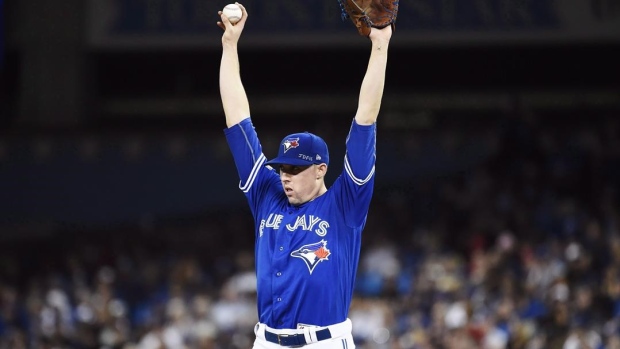Feb 23, 2017
Steve Phillips' Scouting Report: Aaron Sanchez
TSN Baseball Insider Steve Phillips offers a look at how position player scouting reports are actually written out at Spring Training, focusing on five key players from the 2017 Toronto Blue Jays. Next up, Aaron Sanchez.

General Managers are the ones who make trades and decide whether to sign free agents. But the lifeline of every organization is its scouting department. The evaluations a general manager makes and the information he gets from his most-trusted talent evaluators help guide the personnel decisions for an organization.
Player evaluations are based on a 20-80 scale where 50 is a major league-average player, 20 is a poor player and 80 is an excellent player. You can see the scale below.
Some part of every evaluation is subjective while other parts are objective. For example, an average major league arm for a position player is more of a feel for the velocity of the throw and the carry on the ball than any sort of actual reading. While an average fastball for a pitcher is based upon actual velocity (average is 91-93).
Average speed for a player is based upon time from home plate to first base; average for RHH is 4.3 seconds and for LHH it’s 4.2 seconds. A base running grade is more subjective, based upon watching the decisions a player makes while running the bases considering his instincts and speed. It’s an evaluation of the kind of decisions a player make in time and space on the field.
Raw Power is a grade based upon how far someone can hit the baseball. Not by measurement but by what the eyes tell you. Power frequency is based upon literally how many homers someone will hit. The average grade of 50 for power frequency is for 18-23 homers.
For the established major league players, I chose to only give present grades. For the young players who have room to further develop I gave present and future grades to show where they are today and the ceiling that I believe they can still reach.
Remember, 50 is the grade for an average major league player, anything above that indicates an above-average level in a specific tool. Anything below that indicates a below-average level for that tool.
Toronto Blue Jays Position Player Scouting Report
Name: Aaron Sanchez
Born: 7/1/92 (Age: 24)
Bats: Right Throws: Right
Height: 6’4” Weight: 220 lbs
Primary Position: RHS
Contract Status: Jays control for four more years
Grading Scale
80 Excellent
70 Well Above Average
60 Above Average
50 Average
40 Below Average
30 Well below average
20 Poor
Physical/Health/Body Type: Tall, loose and lanky body...filling out into his man body...has added bulk through hard work to help him build endurance...more room for growth...long arms...proportionate build....becoming a physical presence on the mound.
Player Grades
| Tool | Present | Future | Comments |
|---|---|---|---|
| Fastball Velocity | 65 | 70 | Explosive, easy 95-96; growing into more |
| Fastball Movement | 80 | 80 | Top 3 In-game with movement; unreal |
| Fastball Overall | 80 | 80 | Velocity and movement combo unparalleled |
| Curveball | 65 | 70 | Excellent, sharp bite…needs to use more |
| Change | 60 | 70 | Needs to use more…deceptive with movement |
| Control | 55 | 60 | His confidence has led to more strikes… |
| Command | 60 | 65 | Ball down in zone..works both sides of plate |
| Intangibles | 35 | 65 | Growing confidence in posture change...belief |
| Overall Grade | 70 | 75 | One of best young SP...with room to grow, too |
Comments: Sanchez has emerged as a top flight starter. The Jays protected his innings in 2016 and will give him more rope in 2017. Has the stuff to make good hitters look bad...Ball comes out of his hand easy...excellent mechanics when he stays under control. No reason why he can't be a perennial winner and candidate for ERA title...even on days when secondary stuff isn't working, he can survive on his sinking power FB. His posture has changed from last year as he is no longer uuncertain of himself afraid to look you in the eyes. Voice has gotten deeper too because of belief in self.
Expected Impact in 2017: He will lead this deep and quality pitching staff. He will be more and more recognized as he pitches to the level of Corey Kluber, Chris Sale and Justin Verlander again this year. Strikeout numbers will grow as he gains confidence in CB and CH. If I am buying stock, I am buying his.
TSN Baseball Insider Steve Phillips brings a decade of front office experience to his analysis of MLB players and prospects. He directed the New York Mets’ minor-league operations from 1991-1997, at which point he was promoted to general manager, where he led the team to the 2000 World Series and remained in his position until 2003.

